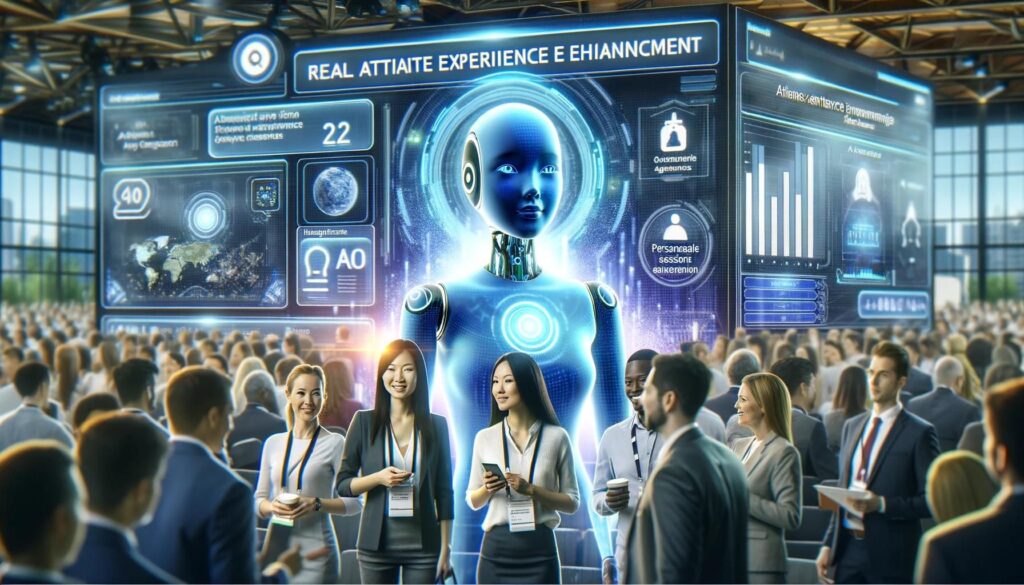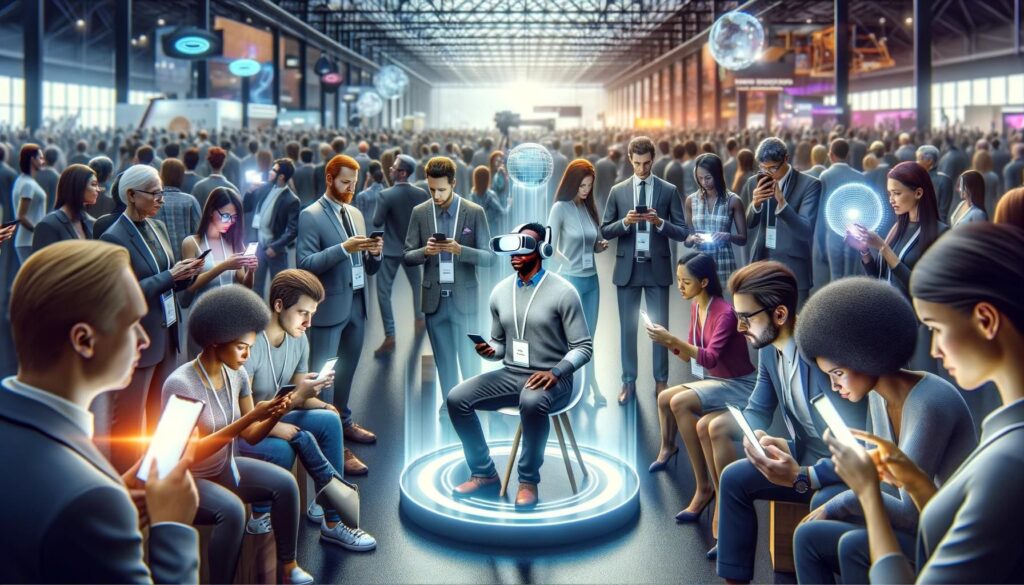In a world where events are a crucial part of businesses and organizations, streamlining event planning and management processes is vital. From corporate conferences to music festivals, events require meticulous planning and execution. However, the incorporation of Artificial Intelligence (AI) is transforming the landscape of event planning and management, making it more efficient and effective.
Understanding AI in Event Planning
Unleashing the Power of Artificial Intelligence
In the dynamic world of event planning, where precision and innovation are paramount, the emergence of Artificial Intelligence (AI) has revolutionized the way events are conceptualized, organized, and executed. Before we delve into the practical applications of AI in event planning, let’s explore the foundational principles and capabilities of this transformative technology.
Key Concepts of AI:
- Mimicking Human Intelligence: At its core, AI refers to the development of computer systems with the ability to perform tasks that typically require human intelligence, such as problem-solving, decision-making, and recognizing patterns.
- Machine Learning (ML): ML is a subset of AI that enables systems to learn from data, recognize patterns, and make predictions or decisions without explicit programming. It’s a fundamental component of AI-driven event planning.
- Natural Language Processing (NLP): NLP allows computers to understand, interpret, and generate human language. This capability is valuable for event communication, including chatbots and personalized messaging.
The Significance of Data:
- Data as the Lifeblood: In event planning, data is the lifeblood of AI. AI systems leverage historical event data, attendee preferences, and market trends to guide planners in optimizing their strategies.
- Actionable Insights: AI transforms data into actionable insights. It helps event planners make informed decisions, predict trends, and enhance the overall event experience.
Automation and Efficiency:
- Automation Capabilities: One of the hallmark features of AI is automation. AI-driven systems can handle repetitive and time-consuming tasks with precision and efficiency, allowing event planners to focus on creative and strategic aspects.
- Customization and Adaptation: AI in event planning adapts to the unique needs and objectives of each event. Whether it’s predicting attendance numbers, optimizing logistics, or tailoring marketing efforts, AI can be customized to align with specific event goals.
AI as a Tool, Not a Replacement:
- Complementary Role: It’s important to recognize that AI is a tool, not a replacement for human expertise. Event planners remain the architects of memorable experiences, while AI acts as a powerful assistant, providing data-driven insights and enhancing efficiency.
As we journey deeper into the realm of AI in event planning, keep these fundamental concepts in mind. They lay the groundwork for understanding how AI can elevate event planning processes, making them more efficient, data-informed, and ultimately, more successful.
Benefits of AI in Event Planning
Enhanced Efficiency
One of the most significant advantages of incorporating AI into event planning is the substantial increase in efficiency. AI-powered algorithms can process vast amounts of data in a fraction of the time it would take a human, helping planners make informed decisions quickly.
Cost Reduction
AI can optimize resource allocation, reduce wastage, and minimize operational costs. For example, predictive analytics can assist in better budget planning and resource allocation, ultimately saving money.
Improved Attendee Experience
AI-driven personalization can enhance attendee experiences by tailoring recommendations, schedules, and content to individual preferences. This results in more satisfied and engaged event participants.
Use Cases of AI in Event Planning
Attendee Registration Simplified
One of the primary pain points in event planning is the attendee registration process. AI-powered solutions can streamline this crucial step, ensuring a seamless experience for attendees. Automated registration systems, equipped with facial recognition and barcode scanning, reduce wait times, eliminate paperwork, and enhance security.
Data-Driven Marketing and Promotion
AI is a game-changer when it comes to marketing and promotion for events. By analyzing vast datasets, AI algorithms can identify potential attendees’ preferences, behaviors, and interests. This enables event organizers to create highly targeted marketing campaigns, sending personalized email invitations, social media promotions, and tailored content to the right audience at the right time.
Smart Logistics and Resource Management
Efficient logistics and resource management are key to the success of any event. AI-driven solutions optimize these processes by analyzing historical data, traffic patterns, and weather conditions. They can recommend the ideal venue based on attendee demographics, assist with transportation planning, and even predict resource requirements, ensuring that everything runs smoothly on the day of the event.
Predictive Analytics for Attendance
Predictive analytics powered by AI can help event planners make informed decisions. By analyzing historical attendance data, seasonality, and market trends, AI algorithms can provide accurate attendance forecasts. This allows event organizers to adjust their plans, allocate resources, and budget effectively, ultimately reducing costs and preventing over or underestimation of attendees.
Real-Time Attendee Experience Enhancement

During the event, AI can play a crucial role in enhancing the attendee experience. Chatbots powered by natural language processing can provide instant assistance and answer common questions, freeing up event staff to focus on more complex tasks. Additionally, AI can analyze attendee behavior and preferences to make real-time recommendations for sessions, activities, or networking opportunities, ensuring attendees get the most out of the event.
Post-Event Feedback and Analysis
The benefits of AI extend beyond the event itself. After the event concludes, AI can analyze attendee feedback, social media mentions, and post-event surveys to provide valuable insights. This data-driven feedback loop allows event planners to continuously improve future events, refining their strategies based on real attendee experiences.
Steps to Implement AI in Event Planning
Before we dive into the step-by-step guide on integrating AI into your event planning processes, it’s essential to understand that AI is not a one-size-fits-all solution. The successful implementation of AI requires careful consideration of your specific event goals, target audience, and the particular challenges you aim to address. By following these steps, you’ll be better prepared to leverage AI effectively in your event planning journey.
Now, let’s explore each step in detail:
Step 1: Define Your Event Goals and Objectives
Start by setting clear goals and objectives for your event. AI can assist in this phase by analyzing past data and market trends to help you define achievable targets.
Step 2: Collect and Analyze Data
Gather relevant data such as attendee demographics, preferences, and past event performance. AI algorithms can then process this data to extract valuable insights.
Step 3: Choose the Right AI Tools and Platforms
Select AI tools and platforms that align with your event planning needs. These may include AI-powered event management software, chatbots, or marketing automation platforms.
AI Tools and Platforms for Event Planning
- Eventbrite
- Eventbrite offers AI-powered features for event promotion and ticketing. Its recommendation engine helps organizers target the right audience based on attendee data.
- Cvent
- Cvent’s event management platform incorporates AI for tasks like venue selection, budget management, and attendee engagement. It offers features such as predictive analytics and personalized event websites.
- Hubilo
- Hubilo is an AI-driven virtual and hybrid events platform. It uses AI to provide personalized content recommendations, chatbots for attendee support, and data analytics for event insights.
- Bizzabo
- Bizzabo’s event platform leverages AI for attendee engagement, matchmaking, and content personalization. It helps event organizers create more interactive and personalized experiences.
- EventGeek
- EventGeek combines project management and budget tracking with AI-powered analytics to help organizers optimize their event planning processes.
- Pathable
- Pathable uses AI for event networking, facilitating connections between attendees with similar interests. It also provides insights into attendee engagement and behavior.
- Chatbots (Various Platforms)
- Many event planning platforms integrate chatbots for real-time attendee support. You can use platforms like Dialogflow, IBM Watson Assistant, or even chatbot builders like Chatfuel to create AI chatbots for your event.
- Marketing Automation Tools
- Marketing automation platforms like HubSpot, Marketo, or Salesforce Marketing Cloud incorporate AI for personalized email marketing and audience segmentation.
- Data Analytics Tools
- Tools like Tableau, Power BI, or Google Analytics can be used to analyze event data and gain insights into attendee behavior and preferences.
- Social Media Advertising Platforms
- Platforms like Facebook Ads and Google Ads use AI for ad targeting, which can be useful for promoting events to a specific audience.
When choosing the right AI tools and platforms for your event, consider factors such as the size and type of event, your budget, and the specific functionalities you require. It’s essential to assess your needs and goals to determine which AI tools will best suit your event planning and management process. Additionally, check for user reviews and testimonials to ensure the chosen tools align with your expectations and objectives.
Step 4: Implement AI for Marketing
Leverage AI for personalized marketing campaigns. AI can analyze attendee data to create tailored content and outreach strategies.
Step 5: Streamline Logistics with AI
Optimize logistical aspects by using AI algorithms to determine the best venue, transportation routes, and resource allocation.
Step 6: Enhance Attendee Experience
Implement AI-driven chatbots to provide instant assistance to attendees. Personalized recommendations can also be generated based on attendee preferences.
Future Trends in AI and Event Planning
AI-Powered Virtual Events
As technology continues to advance, the integration of AI into virtual events is poised to reshape the landscape. AI-driven virtual event platforms will offer immersive and interactive experiences, allowing attendees to network, explore virtual environments, and engage with content in ways previously unattainable.
Enhanced Event Analytics
The future of event planning lies in data-driven decision-making. AI will play a pivotal role in providing event organizers with advanced analytics and insights. Predictive analytics, sentiment analysis, and real-time data visualization will empower planners to make informed choices, optimize event strategies, and adapt to attendee preferences on the fly.
Hyper-Personalization
AI’s ability to gather and analyze vast amounts of data will lead to hyper-personalization in events. Attendees will receive highly customized experiences, from personalized event schedules and content recommendations to tailored networking opportunities, ensuring that each participant feels like the event was designed just for them.
Augmented Reality (AR) and Virtual Reality (VR) Integration

AI will be instrumental in the integration of AR and VR technologies into events. Imagine attendees being able to explore virtual event spaces, attend sessions using VR headsets, or receive AR-enhanced information about exhibitors and sponsors. These technologies will add new dimensions to event experiences.
Sustainability and Eco-Friendly Planning
AI can assist event planners in reducing the environmental impact of events. Machine learning algorithms can optimize transportation routes, minimize resource wastage, and suggest eco-friendly venues, aligning events with the growing demand for sustainable practices.
Real-Time Translation and Multilingual Support
Language barriers will become a thing of the past at international events, thanks to AI-powered real-time translation services. Attendees will be able to participate in sessions, network, and engage with content in their preferred languages, fostering inclusivity and global reach.
AI-Driven Content Creation
AI will be used to generate event content, from automated event summaries and post-event reports to dynamic presentations and marketing materials. This will save time and resources for event organizers while ensuring consistency and quality.
Ethical Considerations and Transparency
As AI becomes more integrated into event planning, ethical considerations surrounding data privacy and AI decision-making will gain prominence. Event organizers will need to prioritize transparency, data security, and the responsible use of AI to build trust with attendees.
Continuous Innovation
The AI landscape is dynamic, and event planners will need to stay abreast of the latest AI advancements. Continuous innovation will be essential to leverage emerging AI technologies and maintain a competitive edge in the ever-evolving field of event planning.
The future of event planning is undeniably intertwined with the evolution of AI. As these trends continue to shape the industry, event professionals who embrace AI’s potential will be well-positioned to create cutting-edge, engaging, and memorable experiences for their attendees.
Embracing AI for Better Events
In the realm of event planning and management, Artificial Intelligence (AI) is driving transformative change. This guide has shown how AI streamlines logistics, enhances marketing, and elevates attendee experiences. It’s not replacing human creativity but amplifying it.
The future of event planning promises even more with AI-driven innovations like virtual experiences, real-time translation, and sustainability efforts. However, with great power comes responsibility; ethics, data privacy, and transparency must guide our use of AI.
In this AI-enhanced event landscape, creativity meets data, and attendee satisfaction reaches new heights. By adopting AI as a strategic ally, event planners can craft memorable experiences that stand out. Welcome to the future of events, where innovation is your advantage, and every moment is an opportunity for excellence.




